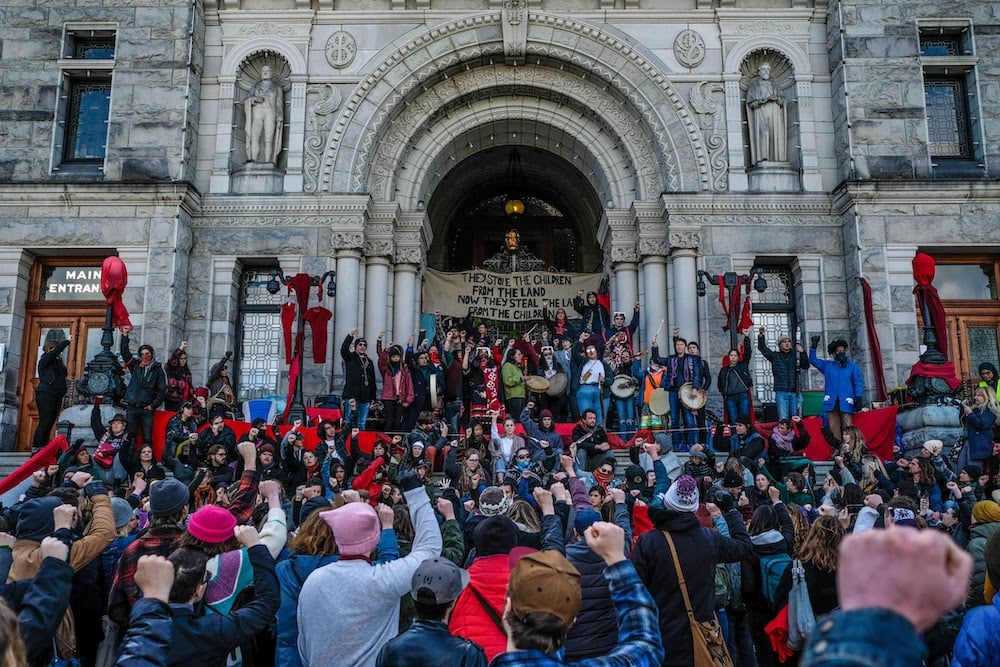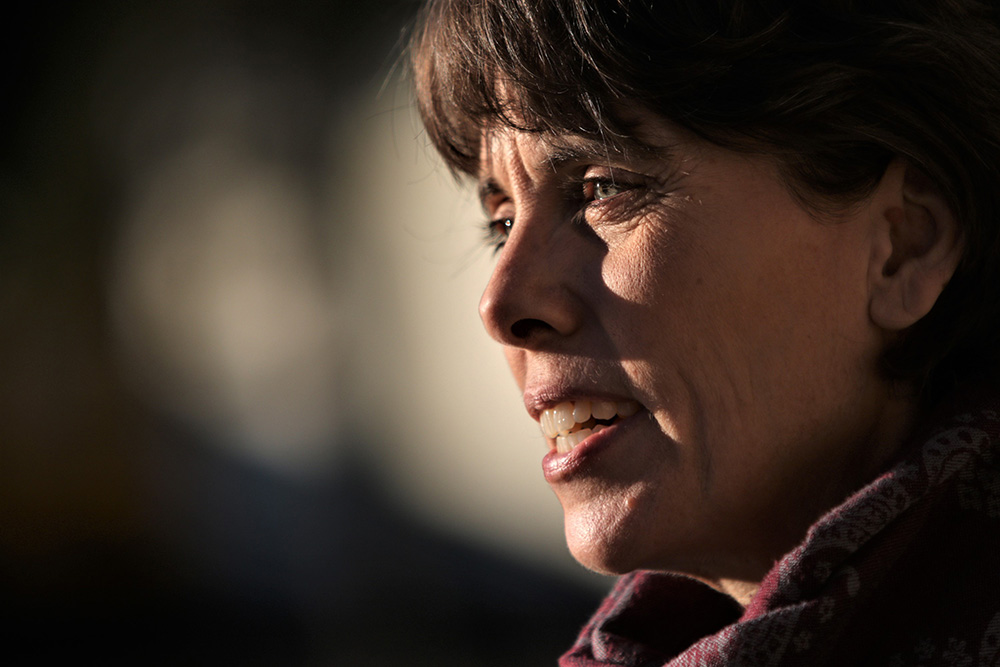Last February, anyone who wanted to get into the B.C. parliament buildings needed to know where the tunnels were or have really thick skin.
The throne speech was set against the backdrop of an illegal invasion of sovereign Wet’suwet’en land by the RCMP to clear a path for a pipeline. Indigenous resisters and allies had established various checkpoints in the territory and blockades of public buildings and infrastructure in the provincial capital. These demonstrations inspired solidarity actions by Indigenous peoples across the country, bringing about the movement to #ShutDownCanada. Occupying the steps of B.C.’s government and shutting down rail lines across Canada were not mere protests, as often described by the media, but skirmishes in a war to defend water, land and law.
I spent the better part of last February and March on the steps of the legislature — as an independent legal observer, then later as one of the demonstration’s liaisons with police — and watched as MLAs headed inside for the speech amidst the roar of land defenders calling on them to join their struggle.
Demonstrators known as the Indigenous Youth for Wet’suwet’en had decided to put pressure on a potential weak link inside the building: the BC Green Party. The New Democrats were only in power because the three Green MLAs promised to support them in a deal called the Confidence and Supply Agreement. If the demonstrators could convince the Greens to threaten a renegotiation or cancellation of CASA, the government might be pressured into halting the invasion. But, perhaps due to the fact that shaking up the agreement with the NDP would damage the Green’s own leverage, the pitch fell flat.
When Green MLAs Sonia Furstenau and Adam Olsen approached the side entrance of the building, they were confronted with a final, deafening plea by hundreds of land defenders blocking the way and thunderously chanting at the legislators to “stand with us.” Instead of joining the crowd likely filled with Green voters, the two MLAs from an environmental party rooted in protest and the defence of land were slowly escorted into the building by riot police.

The next time the two Green MLAs walk into the legislature, it will be in a very different context. Former Green leader Andrew Weaver has retired from partisan life (at least as a Green), the election recount in West Vancouver-Sea to Sky shows that the BC Liberal incumbent Jordan Sturdy squeaked out a win over the Greens’ Jeremy Valeriote, and the NDP won big, meaning they no longer need to give the Greens the time of day or even recognize their presence.
Without their previous leverage, the BC Green caucus will be smaller by one member, far less powerful, and in danger of obscurity after an election that can be best described as a snap referendum on whether the NDP is a trusted steward during a pandemic. But a decline in Green parliamentary power doesn’t necessarily mean the voters rejected the small, environmentalist party this election. They also held on to the two seats required to maintain party status; and more voters — particularly young ones — are prioritizing serious action on the climate, economic policy and reconciliation.
Though technically weakened, I’d argue the Greens are in the best place they’ve been since its inception. Let me explain.
Any list of reasons to be optimistic about the party’s new management has to begin with the fact that Weaver is out as leader. The professor-turned politician represented the party’s older right-wing in a number of ways, beginning with being somewhat indecisive about whether to work with the BC Liberals or NDP in 2017.
Weaver stood in the way of the NDP and opposed pro-worker policies like card check, and orchestrated the delay of minimum wage increases, ironically suggesting that workers getting a slightly fairer share needed to be de-politicized and agreed upon by their bosses.
On climate, Weaver suggested that ordinary British Columbians fight climate change by paying for electric vehicles through taking out a second mortgage. And while Weaver may have dusted his hands after helping to build CleanBC, the province’s major environmental policy and arguably his biggest legacy, B.C.’s increase in subsidies going to private oil and gas companies — including those engaged in fracking — and building Site C don’t look great alongside it.
As one of this province’s electoral reform pedants, including in this publication, I can’t ignore the fact that Weaver also missed a once-in-a-lifetime opportunity to grow his party and transform B.C. politics for the better when he “surrendered control” over the eventually maligned electoral referendum process — a process that could have implemented proportional representation and given the Greens a number of seats in the legislature that actually reflects the number of people who voted for them.
If we unscientifically imagined that the 2020 election had proportional representation rules (unscientific because a different system would likely result in voters behaving differently), the NDP would have 42 seats, the Liberals 29, and the Greens would have 13 — enough for the Greens to again have influence over who gets to govern, and how. But letting the NDP make the decision meant leaving it to a party that had less incentive to ensure reform. Instead, the referendum was overcomplicated, rushed and arguably set up to fail.
The BC Greens squandered their rare opportunity to transform B.C. politics because they were led by a centrist environmentalist from Oak Bay who believes in market solutions to climate change and it certainly didn’t help the party’s case in trying to dispel the joke that Greens are just “Tories who ride bikes.”
When the Greens were making their choice of which party to support to form a government back in 2017, I wrote in Maclean’s about how Weaver’s choices could make or break the provincial Green movement, and his actions lean towards the latter. Shortly after retiring, Weaver took aim at his former colleagues claiming that he retired because they represented the radical left.
Under Sonia Furstenau’s leadership, on the other hand, the Greens have a chance to strike a much more progressive tone. Furstenau arrived to the legislature as an activist defending the waters of Shawnigan Lake* and has been an unwavering advocate against the ongoing colonial abduction of Indigenous children.
No Confidence and Supply Agreement means that the Greens can be full-throated in their offense against the government as a progressive alternative, something the NDP has rarely ever faced in the legislature. Now they can engage in unrestrained opposition (and given the possibility that the NDP will revoke the Greens’ official party status, they will need every tool to get into the spotlight).
Eventually, parties who win big majorities will lose seats. People are already irritated by a government scolding them not to socialize, unless it involves the spending of money. Not to mention the fact that NDP governments tend to find themselves on the wrong side of a strike with old allies. The sheen will, in time, wear off.
There’s a clear path forward for Furstenau’s Greens, if they’ll take it. If they want to grow the party, they need to make the case that people serious about climate change, economic policies that serve workers over owners and reconciliation don’t have to keep holding their nose for the orange team. Pushing for a minimum wage well above $15 and demanding an end to the occupation of the Wet’suwet’en is a start.
The Greens can also only force themselves to do the splits across the political spectrum for so long. They also need to convince progressive voters, including the disgruntled NDP voters, that they are the obvious alternative choice for them instead of trying to be both to the left of the NDP and also in the centre.
Most of the people I saw outside the legislature, whether they provided food, child care, or were putting their bodies on the line — are exactly the kind of people who want to vote for the Greens. This is a burgeoning young base worried about forests on fire on one hand, and rising seas on the other, who will engage in climate action whether or not there is a party that speaks to them.
So, as Sonia Furstenau and Adam Olsen walk towards the legislature when it soon reopens, between the environmentalists outside the building and the entrenched power on the inside, who will they stand with?
*Story updated on Nov. 23 at 2:51 p.m. to correct the name of the lake Sonia Furstenau fought to protect. ![]()
Read more: Rights + Justice, BC Politics
















Tyee Commenting Guidelines
Comments that violate guidelines risk being deleted, and violations may result in a temporary or permanent user ban. Maintain the spirit of good conversation to stay in the discussion.
*Please note The Tyee is not a forum for spreading misinformation about COVID-19, denying its existence or minimizing its risk to public health.
Do:
Do not: